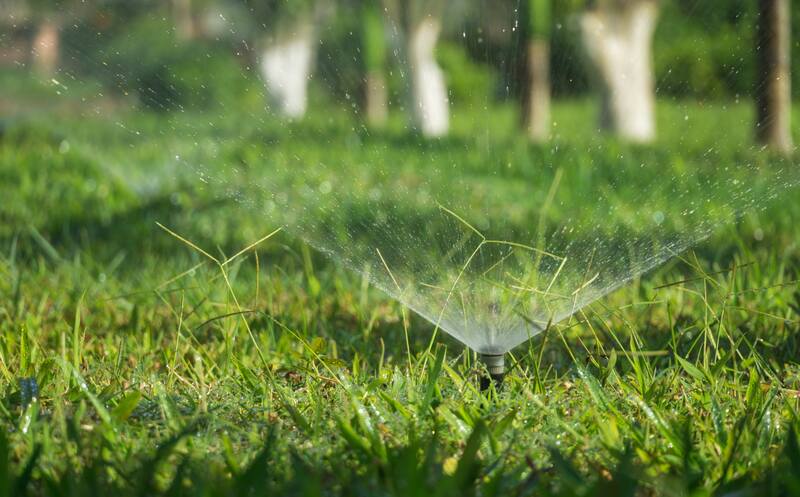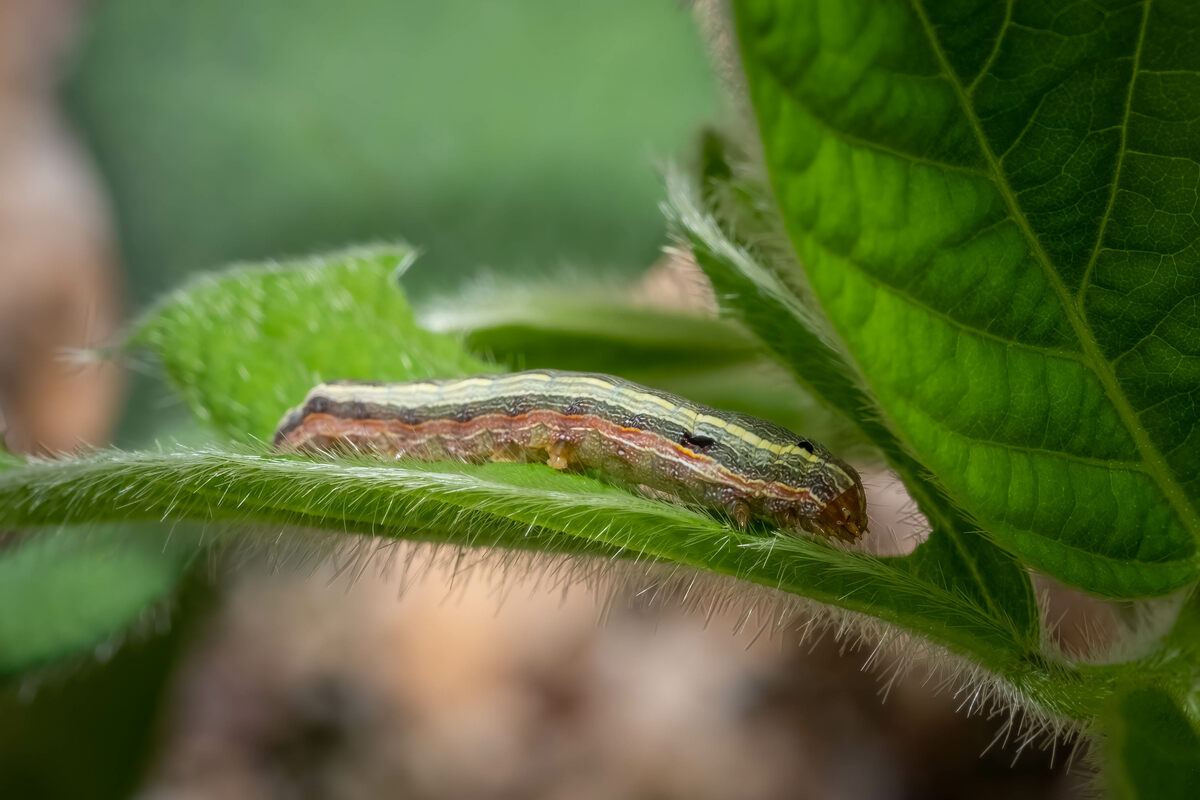
It’s little wonder that your Jacksonville lawn looks great in spring but struggles in summer. The searing heat and drenching downpours are a brutal combination that can leave a lawn alternately withering and drowning between Memorial Day and Labor Day.
So when the mercury climbs here in Duval, there are things you should do: keep your lawn hydrated and your grass longer, and be on the lookout for weeds and diseases that thrive in hot, humid, rainy conditions.
1. Keep Your Grass Hydrated

Jacksonville’s summers bring plenty of rain overall, but it’s famously spotty. You might see two weeks without a drop, then three inches of rain in a single afternoon. That means your grass can still dry out between storms, so you’ll have to irrigate here and there to make up the difference.
Your job is to make sure the lawn gets roughly 1 inch of water every week, whether from rainfall or irrigation.
Here are a few tips:
- Before you run the sprinklers, check the rain forecast. Since your lawn only needs around 1 inch of water per week, watering more than that can invite fungus and waste water.
- When irrigation is needed, water deeply, not daily. Aim for a single 1/2 to 3/4-inch soak twice a week.
- Water preferably in the early morning. Watering before sunrise lets moisture reach the root zone before heat and wind kick in, encouraging grass to push roots deeper, said Justin O’Donnell, owner of JS Home Services here in Jacksonville. “Water early because the soil will have time to absorb the water better than if you water in the middle of the day,” O’Donnell said.
Tip: Keep Jacksonville’s lawn watering restriction in mind before turning your sprinklers on. For more information, check out our guide: Tips for Watering Your Jacksonville Lawn.
2. Leave Your Grass Longer
The best grasses for Jacksonville are warm-season grasses like St. Augustine, Zoysia, and Bermudagrass, which grow fastest in the summer. The simplest way to protect them from extreme heat is to leave the grass a little longer and mow more frequently.
Leaving the grass longer acts like a natural sunblock, shading the soil and keeping surface temperatures lower. It also slows evaporation, keeping the root zone moist between watering sessions.
“During the warmer months, you’ll likely need to mow more frequently, potentially as often as once a week, due to the faster growth of warm-season grasses like St. Augustine or Bermuda,” said Nathan Heaton, owner of NH Landscaping in Jacksonville.
Here are a few extra tips for mowing when the mercury soars:
- Stick to the “one-third rule”: Remove no more than a third of the grass blade in a single pass to avoid scalping, even if your grass is overgrown.
- Mow only when it’s dry: Wet blades clump and clog the mower’s blades, resulting in an uneven and sloppy cut that hurts your turf.
- Keep blades sharp: Mowing with dull blades can leave your grass susceptible to fungal lawn diseases.
- Mulch the clippings: A sharp mower finely shreds clippings, returning nitrogen to the soil and reducing the need for synthetic fertilizers.
3. Stamp Out Pests

Jacksonville’s sticky, 90-degree afternoons are a paradise for lawn pests, especially chinch bugs and caterpillars like sod webworms and armyworms. The warm soil and high humidity accelerate their life cycles, allowing eggs to hatch faster, and thus populations can explode almost overnight.
Watch for early signs, such as patches of grass that are yellow, brown, or thinning out; blades that pull up like loose carpet; chewed grass blades; and small insects scurrying at the soil line.
If you notice these signs, here’s what you can do:
- Hand-pick large worms and drop them in soapy water
- Apply a lawn-safe insecticide, like Bt (Bacillus thuringiensis)
- Consider using herbicides to spot treat pests (but remember always to read the labels)
- Try releasing beneficial nematodes
- Sprinkle diatomaceous earth
- Check our article on Eco-friendly Pest Control for Jacksonville
4. Watch For Lawn Diseases
Hot, humid, wet, Florida summers breed lawn diseases, including large patch, leaf spot, and pythium blight. The keys to keeping them at bay are to not overwater and mow at the recommended height.
If trouble spots appear, such as yellow rings, wilting blades, and brown, dead patches, ID the culprit, then treat only the affected area with a fungicide labeled for that specific disease.
5. Stop Weeds Before They Sprout

Summer in North Florida is also the perfect time for invaders like crabgrass, spurge, and goosegrass. The easiest way to beat them is never letting the seeds germinate in the first place. Apply a pre-emergent herbicide sometime before March 1 to enjoy a weed-free summer in Bold City.
If a few stowaways still pop up (or if you missed the pre-emergent window), here are a few tips:
- Spot-treat them with a post-emergent herbicide, labeled for the target weed, but only when temperatures are below 85 degrees Fahrenheit.
- Hand-pull after rain or irrigation so roots slide out more easily.
- Keep turf thick and mowed taller, to help your lawn crowd out unwanted weeds.
Read More:
– Common Weeds in Jacksonville
– How to Apply Pre-Emergent Herbicides
– Applying Post-Emergent Herbicides to Your Lawn
6. Skip Fertilization
When it comes to fertilizing your lawn in the summer, it’s simple – don’t. There’s a statewide ban on nitrogen and phosphorus products from June 1 to September 30. And you wouldn’t want to apply fertilizer in the high heat of summer anyway; it can burn your turf.
However, if the grass still doesn’t look green enough, you can apply a liquid iron sulfate instead to increase the production of chlorophyll and make your grass greener.
The best time to fertilize is during spring and fall, and luckily, we have you covered with these articles:
– Spring Lawn Care Tips for Jacksonville
– Fall Lawn Care Tips for Jacksonville
– The Best Lawn Fertilization Schedule and Tips for Florida
Keep Your Jacksonville Lawn Healthy This Summer

The heat, humidity, and rain that come with the summertime may pose a challenge to Jacksonville lawns. These conditions can cause problems like weeds, pests, and lawn diseases.
Stay on top of your summer lawn care to prevent these issues, or, better yet, leave it to a local lawn care pro to keep your grass lush in the Florida heat.
We also have local lawn care pros in Middleburg, Jacksonville Beach, Orange Park, and all across the Jacksonville metro area. Call, click, or book mowing in our app.
Read More:
– Winter Lawn Care Tips for Jacksonville
– Growing Zones of North Florida
– Best North Carolina Native Plants
Main Photo: Lawn mowed by a LawnStarter pro in Jacksonville, FL. Illustration by Whitney Lehnecker / LawnStarter